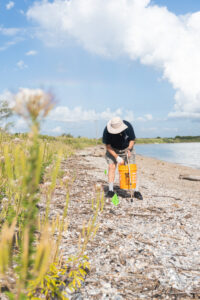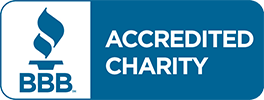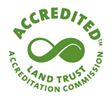2023 Galveston Bay Report Card Released: Learn More About the Health of the Bay and How to Play Your Part
- November 02, 2023
- News

Houston, TX (November 2, 2023) – Today, Galveston Bay Foundation (GBF) and Houston Advanced Research Center (HARC) have released the 2023 Galveston Bay Report Card, an annual citizen-driven, scientific analysis of the health of Galveston Bay. The Galveston Bay Report Card looks at data and trends found in the Bay and surrounding watersheds, an area spanning more than 7,118 square miles, and including communities in Galveston, Sugar Land, Conroe, and beyond.
Originally developed in 2015 through community input and engagement, the Galveston Bay Report Card seeks to ensure that the communities in and around Galveston Bay have a voice in shaping the information they receive about the Bay’s health. Overall, the Report Card’s yearly findings aim to identify and communicate the challenges, opportunities, and areas where the Bay needs community support. The Report Card also seeks to inspire people to take action to protect and preserve the Bay for future generations to come.
Lisa Scobel, GBF’s Marine Debris Programs Coordinator, explains, “An integral part of the Galveston Bay Report Card is ensuring that we continue to listen and engage with the communities that live and work near Galveston Bay, since ultimately, they are the ones most impacted by its health. This year, we continued this commitment by working with the crabbing community in Chambers County, and as a result, we are working on materials written in Vietnamese, including a brochure, educational handout, and translated Galveston Bay Report Card website, to continue those conversations, and help tailor the Report Card to meet community needs.”
The 2023 Galveston Bay Report Card’s results are based on analyzing data collected throughout 2022 on 18 ecosystem indicators. These indicators are organized into six categories: water quality; pollution events and sources; wildlife; habitat; human health risks; and coastal change. Each of these categories and their underlying indicators are graded like a school report card from “A” to “F”, with “A” meaning the indicator is in excellent condition, and “F” meaning it is in critical condition. Some indicators can also receive an “I” where there is insufficient data available to provide a grade.
This year, the Report Card’s notable findings were in the areas of water quality, wildlife, and coastal changes as follows:
Water Quality
- Most categories received an “A”. Overall, the levels of nutrients and dissolved oxygen found in the 2022 water samples were at acceptable levels for supporting diverse and healthy aquatic life. The water quality issues that do arise are primarily due to runoff and wastewater from human activity.
- Some watersheds received lower grades, such as Barker Reservoir, which received a “C” for nitrogen and an “F” for phosphorus. As the “F” grade is considered critical, the current levels of phosphorous could likely negatively impact fish and wildlife in the water and action is required to reduce these levels. Too much of these nutrients can lead to algae blooms, which can deplete oxygen in the water. To keep excess nutrients out of waterways, it is important to prevent over-fertilization of lawns and to help control excess erosion as soil can carry phosphorus into waterways.
Wildlife
- Most bird populations are holding steady, earning a “C” grade. However, this year, the roseate spoonbill, tri-colored heron, and laughing gull all showed a moderate population decline, going from a “C” to a “D”, while the snowy egret maintained a “D”.
- Overall, shellfish and finfish categories continued to earn a “C”. Sand seatrout and bay anchovy improved from a “C” to a “B”, and the spot declined from a “B” back to a “C”.
Coastal Changes
- Sea level rise continued to increase, earning an “F” again. As this continues and weather patterns change, alternating between extremes of drought and flood and extreme heat and cold, measurable changes in the physical environment of Galveston Bay should be expected.
- The water temperature for Winter 2022 was 10% higher than the average values for the previous 15 years for the first time since the creation of the Report Card. This brought the grade down from an “A” to a “B”. Winter water temperature is an important indicator for invasive species and can indicate overall warming that can impact bacteria production and stress Galveston Bay organisms. Water temperatures will need to be monitored for their potential impacts on other indicators.
Human Health Risk
- In most areas of the Bay, seafood continues to remain safe to eat. However, due to oyster fishing closures at the end of 2022, the Seafood Safety grade dropped from a “C” to a “D.” While these specific closures and related oyster consumption concerns are no longer relevant today, it is a reminder to monitor local seafood advisories in your area.
HARC’s Research Scientist in Coastal Ecology, Dr. Erin Kinney, highlights, “We are really pleased that we were able to collect more data this year, bringing us closer to pre-Covid levels in terms of our ability to collect and analyze data. The more information we are able to collect, the better we’re able to paint a more complete picture of the health of Galveston Bay. This also helps us to better understand what is impacting the Bay and how best to protect it as a community. Even with all the changes going on around the Bay and its watersheds, our Bay is resilient, and our collective action will help keep it healthy and resilient for years to come.”
In addition to providing a yearly snapshot of the state of the Bay, the Galveston Bay Report Card provides several tools, suggestions, and resources to show people how they can play a role in keeping the Bay healthy. The Galveston Bay Report Card website, www.galvbaygrade.org, provides information on how to recycle, reduce trash, and tackle pollution. The What You Can Do tool provides practical tips on how to help the Bay based on a person’s interest and availability. The Galveston Bay Foundation’s events page www.galvbay.org/events provides an overview of upcoming events, such as beach clean ups, and other opportunities to get involved.
–Ends–
About the Galveston Bay Foundation
Established in 1987, Galveston Bay Foundation is a nonprofit organization that serves as the leading voice for the Bay. The mission of the Galveston Bay Foundation is to preserve and protect Galveston Bay as a healthy and productive place for generations to come. You will find Galveston Bay Foundation in schools, communities, on the water, and on the ground, working in six main program areas: education, habitat restoration, water protection, land conservation, advocacy, and research. For further information, contact us at 281.332.3381, visit galvbay.org, follow us on Facebook and Instagram.
About Houston Advanced Research Center (HARC)
HARC is a 501(c)(3) nonprofit research hub providing independent analysis on energy, air, water, resilience, and climate equity. Its research activities support the implementation of policies and technologies that promote sustainability based on scientific principles. HARC applies science to drive solutions for a sustainable and equitable future. For further information, visit HARCresearch.org or connect via Instagram, LinkedIn, Facebook, or Twitter.




